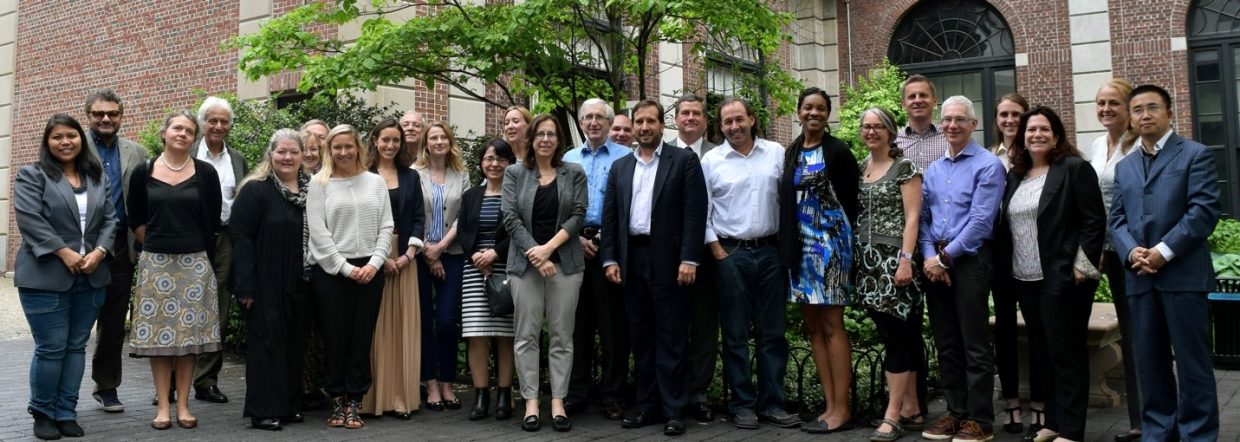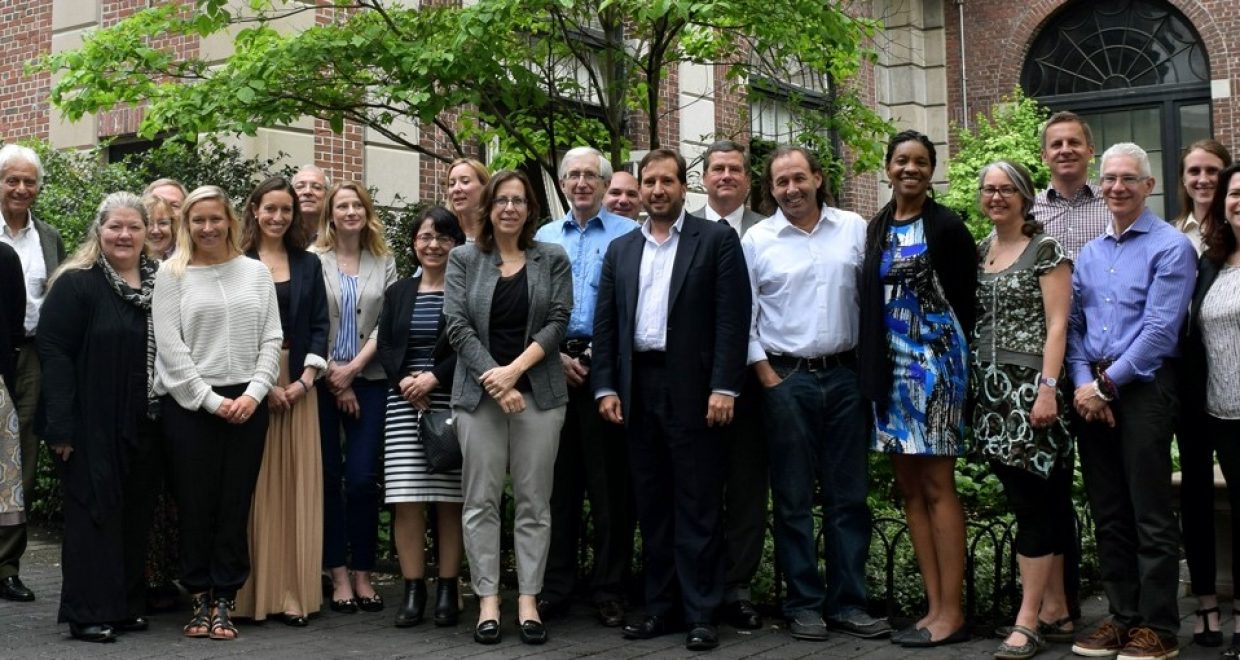The role of Milton Friedman in training the next generation of business leaders
September 13th is the 50th anniversary of the seminal Milton Friedman article from The New York Times Magazine, “The Social Responsibility of Business Is to Increase Its Profits.” This article is still a fixture on the syllabi of many members of the Teaching Business and Human Rights Forum, who teach in law, business, and humanities faculty at the undergraduate and graduate levels all over the world.
I invited the Forum to discuss how and why they include the Friedman article in their syllabi; below are the members who participated. (The transcript was edited for brevity and clarity.)
- Rachel Chambers, Post-Doctoral Fellow, Human Rights Institute, University of Connecticut
- Anthony Ewing, Co-Director, Teaching Business and Human Rights Forum; Lecturer in Law, Columbia Law School
- Lisa J. Laplante, Professor of Law; Director, Center for International Law and Policy, New England Law | Boston
- Wesley Longhofer, Associate Professor of Organization & Management, Goizueta Business School, Emory University; academic director, Roberto C. Goizueta Business and Society Institute
- Terry Nelidov, Managing Director, Erb Institute, University of Michigan
- Salil Tripathi, senior adviser, global issues, Institute for Human Rights and Business; Faculty, Masters course in Business & Human Rights hosted by Department of Comparative Politics of the University of Bergen, the Rafto Foundation for Human Rights, and the Institute for Human Rights and Business
- Ursula Wynhoven, Adjunct Professor, Corporate Sustainability, Business and Human Rights, Fordham University School of Law

To kick off the discussion, I asked why the Friedman article is still so relevant today, 50 years after its publication.
Salil Tripathi: Friedman carries with him so much baggage that people have a view regardless of what he’s writing, and people want to use him to advance the argument they want to make. I grew up in India; in India we thought he was great because the way socialism was practiced in India was so terrible that nothing seemed to work from the state, so you wanted to support or believe in individual freedom and initiative. It really depends on the context where you want to read him.
But who are share-holders today? Some people who trade actively may own stocks for 17 seconds, so how can we imagine that those people have the best long-term interests of an oil company and think of a “just transition” [away from fossil fuels]? How much power do we as society want to concede to the private sector in places where the state is failing? We certainly don’t want a universe where Shell, Total, and Exxon run the police force in Nigeria. The fact that the business has to only focus on its profit-making role and not try to fix the world may not be a bad thing: Do we want the entire COVID battle to be dealt with mainly by Bill Gates and others today? All kinds of extremely interesting questions about the role of business in society come up—and I think that’s why it is an important essay.
Lisa Laplante: I have a class designed for the students to get immersed in the debate about maximizing profit versus other approaches: They have to make a pitch to a board of a company on why they should adopt a human rights approach. This year I am going to assign Lynn Stout, because I teach in a law school and she debunks the Chicago school of thought that the law supports [Friedman’s] argument. It’s so important to give our students the ability to challenge that.
I also use [Friedman] as a way to lay the groundwork for the next week to introduce B Corporations and shared value, to open up their minds to the fact that there are other ways of doing this and in fact it’s happening now. It’s to say, “This is actually a cultural artifact. We eat it with our morning cereal. If you grow up in this country, you can’t avoid it.”
Rachel Chambers: I teach undergraduate in the business school at the University of Connecticut. While I don’t think my students would necessarily have engaged with the text before reading it for my class, they certainly have been taught through their business school education that profit maximization is the norm. So I’m already challenging their received wisdom by introducing contradictory viewpoints such as Lynn Stout’s and by making them think more deeply about Friedman’s argument.
I have him up front in Week Two, paired with the Business Roundtable’s statement on the purpose of corporation to try and challenge that profit maximization is the way; and to look at what companies are saying about this through the Business Roundtable, through Larry Fink’s letters, and then to think about whether these statements are genuine or disingenuous, and what they mean.
Students actually really enjoy grappling with Milton Friedman and the issues that his statement raises, in my experience.
Anthony Ewing: It is a relic, but it also serves a purpose. I find it still is pedagogically productive. I use it to mark an extreme orthodox economic perspective on one end of the spectrum of corporate responsibility definitions.
I come back to it later when I do an exercise where I have students argue for conducting human rights due diligence to the board of a hypothetical company. Sometimes I will parrot back very extreme, Friedman-esque language playing the role of Board Chair, and have them push back on it.
Terry Nelidov: We’re a dual degree program between the business school and the School for Environment and Sustainability. We use Friedman in two areas: with our incoming students in their orientation seminar in their first year of our three-year program, and with executives in our sustainability academy with executive education. We use it specifically to draw the distinction between a shareholder-based view of the firm and what we call the stakeholder-based view of the firm.
As Rachel was saying, the default is profit maximization. I don’t think anyone in the MBA program actually comes out and says that, but it is so clear: In every single course in finance, it’s maximizing the marginal utility; in accounting and marketing and competitive strategy; in human resources, it’s maximizing outputs on the human resources.
So that’s the given; and we’re just trying to say that expectations have changed over time of business and that there’s something called a stakeholder-based view of the firm, where the shareholder is not the only criteria for decision-making.
Wesley Longhofer: I read [the Friedman piece] and thought, as a sociologist, “Why would we take corporate law or business practice from a New York Times Magazine article? It doesn’t make any sense. There has to be some other history to this.”
So I dug into the history of the corporation. I teach it as almost the end of this 200-year story where you have this constant negotiation on the purpose of the corporation between the corporation and the society it exists in. We talk about the history of the railroads, the first anti-corporate protest in the United States, the growth of big public companies in the 1950s, 1960s. Friedman is just part of that history.
Then I give [students] two pieces of evidence for the role of the corporation now: One is the declining number of publicly listed corporations with, “How would Friedman explain that if the purpose of a corporation is to maximize profits for shareholders, and we have fewer of them, does that make sense?”
The second is, I ask them to submit a meme that they think accurately represents the role of corporations in society. They’re all about corporate power, corporates setting policy, profit-seeking corporations that are exploiting workers, exploiting the pandemic—and these are all business students. Wait: You depict the corporation as this monolithic, powerful, shaping our public life, the arbiter of morality, shaping policy—yet you also agree with Friedman. How do we make sense of this?
They like the eloquence of it, but they don’t really believe that it matches reality. They like the fact that there’s this clean separation; they like that it’s really an article about democracy and public institutions and the role of taxation.
But they only read it in my class. If you look at these surveys of MBAs, they all say the main purpose of the corporation is to maximize shareholder value. Where did that idea come from? Could it possibly come from this?
I’ve been teaching since 2012; every year, the pro-Friedman side would win because the argument was always so clean and simple. Until last year: The anti-Friedman side won, because I think we were in a very different time in the world. Things are much more messy than they were in 2015.
Lisa Laplante: There are some assumptions about what exactly makes profit. The shareholder value argument: We don’t like it because it seems inherently against human rights. But what about the argument that respecting human rights increases profit? Is it that rights are necessarily incompatible or is it that we’ve just understood profit to mean one thing? Companies are supposed to make a profit, but what does that mean? And is it always true that violating human rights gets them to a profit?
I always feel a bit conflicted about the mining company that becomes a feudal society of a community and is providing their schools and their water. There’s a dependency that’s really dangerous. The government needs to be involved.
Salil Tripathi: I wish we had reliable credible evidence that having good policies is good for shareholder value, or not having them is bad for shareholder value: that if you have all the right policies, the market will reward you. The fact is, markets don’t necessarily do so. Markets happen to be an amoral entity.
I don’t even want to get into the fact that a company may have one of the best water emissions policies in the world—and yet it has security forces guarding its facility that kill people. How do you deal with that? I still remember when I was involved with the [United Nations] Global Compact during its early days and representing Amnesty there: One of the trade unions was extremely proud that they had come up with a global framework agreement to eliminate child labor from tobacco farms. They thought they should get praise for that from the Global Compact. I said, “Yes, but you’re in tobacco as a business. How is that good for human rights?”
That’s a very long way of saying that it’s very hard to identify good practices that lead to profits. When Amnesty International wrote the Human Rights Principles [for Companies] in ‘98, the argument we always made was, “You have to do it regardless of whether it’s good for your business or not. Don’t try to look for capital appreciation or reward. If that happens, that’s great.” Without being facetious, it is like the Hindu approach in the Gita: You do your duty and don’t wait for the reward.
Wesley Longhofer: The danger of historicizing Freedman is that you put his article 50 years ago, but the [Michael] Porter idea of shared value: it’s just a re-articulation of it. It is: You can maximize shareholder value by protecting human rights and the environment.
The problem with that, when you give examples, is that you’re always selecting on the dependent variable, and you’re always cherry picking, and it’s not meant to apply to the entire company. It’s not meant to apply to the motives of a manager. It’s meant to simply explain a product or a supply chain issue, and it isolates it from the role of the organization itself. Business students love it because it’s completely consistent with how they envision social responsibility, and it’s in line with Friedman.
Anthony Ewing: Part of the fun of using Friedman is using his own words against the supposed clarity on first read. I want the “a ha” moment for one of my students to be, “Wait, but aren’t human rights the ‘rules of the road’?”
Terry Nelidov: At the Erb Institute, we’re coming up on our five-year strategic planning process. We started in January, but it got interrupted by the pandemic and we decided to wait. But we decided to hit pause because we believe that beyond just the logistical issues of doing strategic planning this year, there’s the pandemic, there’s a racial justice movement, there is an economic meltdown and there is a new role that business has already stepped up to in society.
We believe that will have fundamental implications for the role of business in society. So we’re starting to frame it around the future of capitalism. If we take Milton Friedman down, what are we left with? We hear about stakeholder capitalism. We hear about conscious capitalism. We hear about resilience. We hear about purpose. We can’t put a label on it yet, but we believe that there is a fundamental shift of what we all as stakeholders expect of business.
One of our professors, Andy Hoffman from the business school, when he talks about capitalism and Adam Smith as the father of capitalism, he says [Smith] didn’t create capitalism. He didn’t create the market. He just described something that was already happening: what society expected of this mechanism of business and markets to do for it. If that’s changing now, then capitalism and markets and companies have to change too.
Lisa Laplante: I’m not so sure it’s just what Friedman was describing: I think it was a choice. There were people with vested interests in making sure that this paradigm took root; I think there was a lot of indoctrination, manipulation. So in finding the substitute, you’re replacing it with a different indoctrination–that’s what we do in our courses.
I think this whole idea that capitalism is supposed to run a certain way, that it’s supposed to be about profit, the invisible hand: We just assume that’s the truth, and somehow we’re being radical by challenging it with these other models. But those other models could have been chosen as the truth back then too. The corporation didn’t have that much power back then, but never underestimate the power of some elite to make the masses buy into something for their own benefit.
Ursula Wynhoven: It’s still worthwhile teaching him because I feel that part of what we’re trying to do is to equip students to be able to argue against this dominant paradigm that they are going to encounter from a lot of people, and to be able to argue for the resources to do what they need to do to advance human rights and sustainability. You can drive a human rights or sustainability truck through his exceptions, which I think is helpful because the students can then use that when they’re having these arguments.
Two weeks ago I was having dinner with someone who’s the head of ESG for this big investment firm. He said to me, “But we have to maximize shareholder value.” Here’s an ESG guy who’s still telling me this, and he wasn’t lamenting it—he was saying, that’s the reality.
Lisa Laplante: The difference between 1970 and now is, I don’t think companies can get away with just saying “profit first.” The sports teams that are now protesting: Those are corporations and had to respond to the demands for justice. There is a paradigm shift: There are some old-schoolers, but I think it’s a really different time.
Terry Nelidov: Lisa mentioned how we define profit, which is something that I think is a really important point. Because if we’re not ready to take Friedman off his pedestal—it’s time, but if we’re not, does it mean better defining profit? How do you include environment? How do you include social access, human rights? How do you account for those things in a definition of profit that’s an alternative or interim approach to making markets work better: using that mechanism itself, but in a more intelligently defined way?
Salil Tripathi: increasingly companies are no longer using stock markets to raise their capital. If capital is raised through private equity or private placements, or going to wealthy individuals such as Peter Thiel, this entire conversation becomes moot.
Wesley Longhofer: Oftentimes we’ll look at the Business Roundtable statement to say, “Maybe things are changing.” But if you look at what the Business Roundtable wrote in 1981, it was the exact same thing: “The long term viability of the corporation depends upon its responsibility to the society of which it is a part.”
Anthony Ewing: The better current example that I use is what Blackrock is saying about corporate purpose, and what their investment managers are actually doing: what they’re asking of their portfolio companies and which companies they’re divesting from actively managed funds.
With gratitude to Meg Roggensack and Anthony Ewing, Co-Directors of the Teaching Business and Human Rights Forum, for creating the opportunity for this conversation, and more broadly for building the community of people passionate about teaching business and human rights to the next generation of leaders.
In case you wish to further delve into this topic, have a look at our article in the BHRJ on corporations and their moral rights and obligations in light of the UN Guiding Principles.
Christine Bader is the author of The Evolution of a Corporate Idealist: When Girl Meets Oil and co-founder of The Life I Want (thelifeiwant.co), a storytelling project reimagining a future of work that works for all. She co-taught a master’s level seminar on Human Rights & Business at Columbia University, and from 2006-11 was Advisor to the U.N. Secretary-General’s Special Representative for business & human rights.






